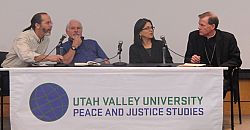Bishop Wester joins discussion panel on immigration at UVU

OREM — The Most Rev. John C. Wester, Bishop of Salt Lake City, joined three other experts on immigration in a panel discussion March 29 at Utah Valley University as part of the sixth annual J. Bonner Ritchie Dialogue on Peace and Justice. Bishop Wester is the immediate past chairman of the U.S. Conference of Catholic Bishops’ Committee on Migration and Refugee Services. Prior to participating in the panel, he gave a presentation on the Catholic perspective on migration, stressing that Scripture and Church teachings give a moral imperative to help strangers in need. "We see this as a moral issue," he said. "It involves human beings, not just economics." His presentation and the panel were part of the three-day Borders: Global and Local, Problems and Possibilities event sponsored by the university’s Peace and Justice Studies Department. Other presenters included Mark Alvarez, a Utah attorney and writer on immigration; Charles Bowden, a nationally syndicated journalist and author; and Olivia Ruiz, a cultural anthropologist whose research focuses on immigration along Mexico’s borders. Ruiz was among those on the March 29 panel. Other participants were Lynn England, a lecturer in history and political science at Utah Valley University; and Russell Askren, a UVU adjunct professor. The current immigration system is broken, "it’s hurting people, and that’s not acceptable," Bishop Wester said. "Therefore, we have to reform the system." The United States needs an immigration system that will allow it to control its borders, which it has the right and the responsibility to do, but the system also must allow people to come and go more freely and not die in the desert trying to improve their lives, the bishop said. Despite the risks of crossing the border illegally, many people do so because they feel it’s the only way they can get a better life for themselves and their families, England said. He added that, for an average person in Mexico, there is a 12-year wait for their application to be processed, and there is no guarantee a visa would be granted. "So there is very strong motivation" to come illegally, because it’s quicker, he said. "We have a responsibility as human beings to do something about that suffering," Ruiz said. "We have to address this in a responsible way. It’s not going to go away. " One cost that the Catholic Diocese of Salt Lake City has incurred because of the current immigration law is that a seminarian who had come to this country illegally as a child recently was sent to Mexico and won’t be able to return for at least three and quite probably seven years, Bishop Wester said. The mood in the United States right now is hostile to most immigrants, the panelists agreed, so "you have to focus on what you can actually accomplish," Askren said. Because politics is a process and a dialog, working toward small goals, rather than sweeping changes, is acceptable, Askren said. "To the extent that we’ve made it better for some people in particular circumstances, we’ve done a good thing." Ruiz suggested that rather than approaching the matter as a immigration issue, advocates could approach it as a family issue or a women’s issue. "You can work to help people … through those kinds of paths as opposed to trying to address immigration laws or immigration reform head on," she said. Even if immigration reform occurs in the United States, it won’t help if the economic issues behind immigration aren’t addressed, Bishop Wester said. "Many times immigrants are looked at as commodity," he said. "Until we have the political will and the drive to look at how we treat human beings and look at those economic issues…it frankly looks bleak."
© Copyright 2025 The Diocese of Salt Lake City. All rights reserved.

Stay Connected With Us